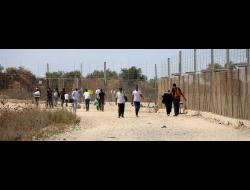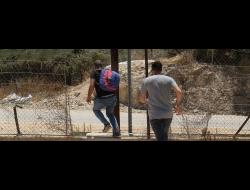Update: On 17 June 2013 the MAG Corps wrote that the soldier who shot Darawish was given a seven-month prison sentence, a suspended prison sentence and was demoted to sergeant. For the full verdict (in Hebrew), click here. On 14 July 2014 the MAG Corps indicted the commanding officer of the soldier who fired on charges of negligent manslaughter with regard to Darawish. On 15 July 2015 the MAG Corps informed B’Tselem that the soldier’s commander had been acquitted of charges of negligent manslaughter.
 According to information obtained by B’Tselem, at around 12:30 PM on Saturday 12 January 2013,, 21-year-old ‘Udai Darawish left his house in Dura to travel to a construction job in Israel. Darawish was in a van taking Palestinians who work in Israel without permits as far as a breach in the Separation Barrier. Once through the gap, the workers would get into another vehicle. At around 1:30 PM, the van reached the opening in the barrier near the village of a-Ramadin, a few hundred meters west of the Meitar checkpoint. The driver stopped and waited until a military jeep, standing stationary on the other side of the opening in the barrier, drove away. Once the jeep was some distance away, the van approached the barrier, its passengers got out and began crossing through the opening. As they were crossing, the workers noticed soldiers who evidently had hidden nearby. The workers began to run towards the car on the Israeli side. The pursuing soldiers shouted for the Palestinians to stop and began firing in the air and at them. Darawish was hit in the lower body and was left behind. After about half an hour, an ambulance took him to Soroka Hospital, Israel, but died of his wounds shortly afterwards.
According to information obtained by B’Tselem, at around 12:30 PM on Saturday 12 January 2013,, 21-year-old ‘Udai Darawish left his house in Dura to travel to a construction job in Israel. Darawish was in a van taking Palestinians who work in Israel without permits as far as a breach in the Separation Barrier. Once through the gap, the workers would get into another vehicle. At around 1:30 PM, the van reached the opening in the barrier near the village of a-Ramadin, a few hundred meters west of the Meitar checkpoint. The driver stopped and waited until a military jeep, standing stationary on the other side of the opening in the barrier, drove away. Once the jeep was some distance away, the van approached the barrier, its passengers got out and began crossing through the opening. As they were crossing, the workers noticed soldiers who evidently had hidden nearby. The workers began to run towards the car on the Israeli side. The pursuing soldiers shouted for the Palestinians to stop and began firing in the air and at them. Darawish was hit in the lower body and was left behind. After about half an hour, an ambulance took him to Soroka Hospital, Israel, but died of his wounds shortly afterwards.
F.G., one of the workers in the van with Darawish, recounted the incident to B’Tselem's field researcher Musa Abu Hashhash:
Three of us left Dura together on Saturday, 12 January 2013, at around 12:30 PM. We got into a taxi that took us as far as the village of a-Dhahiriyah. There, we got into a workers’ transport van that was also transporting women on their way to cross the Separation Barrier into Israel. At around 1:30 PM we got to the border area, about 300 meters west of Meitar. When we got there, I saw a military jeep standing right behind the barrier. We waited about half an hour until the jeep left, and then decided to go in through the opening in the barrier. Right after we crossed, some other workers and transport drivers who were waiting for us there phoned us to wanr us that the soldiers were coming up to us.
We realized that the jeep had apparently dropped off the soldiers in the valley without our noticing. We were flustered. At that point, we couldn’t go back to the other side of the barrier because the soldiers were closer [than we were] to the opening. The three of us started running toward the dirt road where the car was waiting for us. The car was there when we had driven up, but when the driver saw the soldiers, he made a quick U-turn and waited for us about 30 meters away.
We started running toward the car. I heard shots and the soldiers shouting behind us, cursing us. We didn’t stop, because we hoped we’d be able to make it to the car quickly. ‘Udai was running ahead of us. The bullets hit the ground under my feet and behind me. In a few moments we had reached the car. I heard ‘Udai screaming that he had been hit in the leg. I was already in the car and my brother M.G. was getting in behind me. The car drove off at high-speed.
An investigation was launched by the Military Police Investigation Unit (MPIU) that same day, in line with the MAG Corps policy announced in April 2011, stipulating that an MPIU investigation be opened immediately in any incident in which a Palestinian is killed by soldiers, in circumstances other than combat.
According to media reports, on 18 March 2013 a signal operator with the force was convicted of negligent homicide in the death of ‘Udai Darawish. Reportedly the prosecution intended to charge the soldier with homicide, but the charge was reduced in a plea bargain. The soldier has not yet been sentenced. Reports also state that a hearing is currently underway in preparation for filing an indictment against the soldier’s company commander.
The indictment of soldiers who have killed Palestinians is extremely rare. From 29 September 2000, the beginning of the second Intifada, through 31 March 2011, Israeli security forces in the West Bank and the Gaza Strip have killed at least 3,024 Palestinians who were not taking part in combat. Of that number, 2,821 were killed by the military. Until the MAG Corps policy was changed in April 2011, few investigations were conducted in cases of Palestinians killed by soldiers. A Yesh Din report and B’Tselem data show that, of all such incidents through April 2011, only 14 resulted in indictments.
In two of the 14 indictments, the defendants were found not guilty. The other 12 indictments resulted in convictions, including five through plea bargains. Two defendants were convicted of negligent homicide (One of these two defendants was also convicted of giving false information and of unbecoming conduct.) The other soldiers indicted were convicted of lesser offenses: six were convicted of illegal use of weapons, three of negligence, and one of exceeding his authority so as to endanger lives or health.
Since April 2011, when the MAG announced its new policy requiring an MPIU investigation in every case in which a Palestinian is killed in the West Bank not in a combat situation, 18 Palestinians in 16 different incidents have been killed in the West Bank. To date, these incidents culminated in an indictment in only one case – in the killing of Darawish. As for the other incidents: In one case, an investigation was not opened and in another, the case was closed without any legal measures having been adopted. In three cases, in which the investigation has been completed, are pending a decision by the MAG Corps on whether to indict; in the remaining ten cases, the earliest of which dates back to August 2011, the investigation is yet to be completed.
The military’s handling of the Darawish case is exceptional both in the efficiency of the investigation as well as in the rapidity at which a verdict was handed down. In the other cases, an interval of at least a year elapsed between incident and verdict, with an average of more than two years between incident and verdict.


